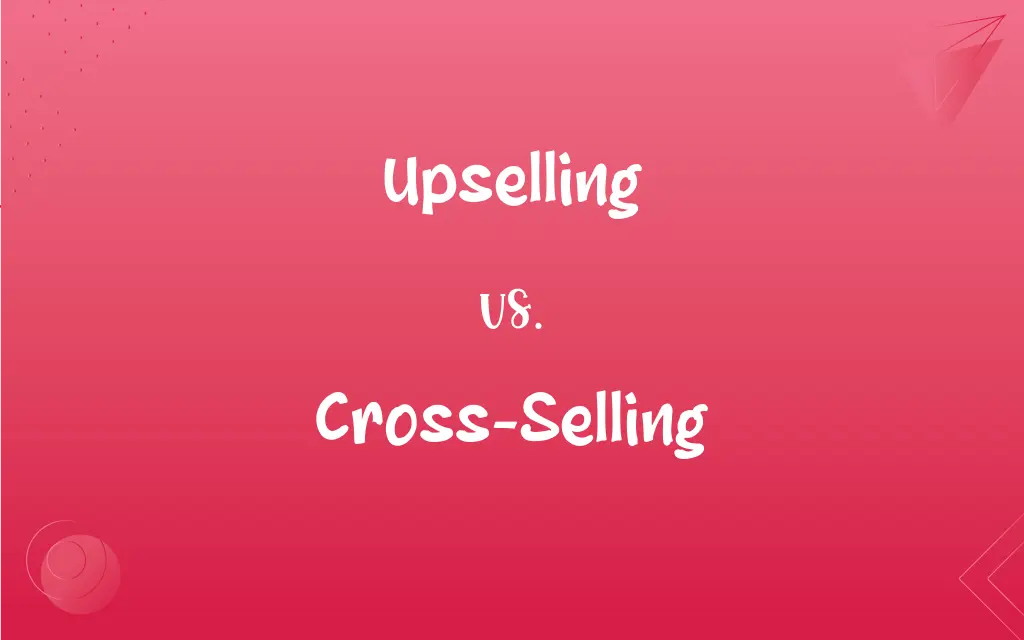Upselling vs. Cross-Selling: What's the Difference?
Edited by Aimie Carlson || By Harlon Moss || Published on November 28, 2023
Upselling encourages customers to buy a higher-end product, while cross-selling recommends complementary products.

Key Differences
Upselling involves encouraging a customer to purchase a more expensive item or a premium version of their chosen product. Cross-selling, on the other hand, involves suggesting related or complementary products to what the customer is buying.
The goal of upselling is to increase the value of a single purchase, by offering upgrades or better versions. Cross-selling aims to increase the number of items a customer buys by showcasing products that pair well together.
For instance, in upselling, a salesperson might suggest a laptop with higher specifications than the one a customer initially chose. In cross-selling, the salesperson might suggest a mouse, keyboard, or laptop bag to go with that laptop.
Upselling usually targets the primary product, aiming to enhance its value. Cross-selling, in contrast, looks at the breadth of products, focusing on adding more variety to the customer's purchase.
In essence, while upselling looks to maximize the value of a single product choice, cross-selling seeks to broaden the customer's purchasing spectrum by introducing them to additional, relevant items.
ADVERTISEMENT
Comparison Chart
Primary Focus
Enhancing the primary product's value.
Introducing complementary products.
Goal
Increase the value of a single purchase.
Increase the number of items purchased.
Example Products
A laptop with higher specifications.
Mouse, keyboard, or laptop bag.
Sales Approach
"Would you like the premium version?"
"Would you like a product that complements your purchase?"
Customer Benefit
Getting a better version of their initial choice.
Finding related items that enhance the primary product's use.
ADVERTISEMENT
Upselling and Cross-Selling Definitions
Upselling
Encouraging the purchase of a more expensive item.
For just $50 more, you can get the version with double the storage.
Cross-Selling
Recommending complementary items to enhance the main product.
These headphones would go great with your new laptop.
Upselling
Suggesting a product that offers more value.
The pro model has extended battery life and better performance.
Cross-Selling
Proposing related products to a primary purchase.
This protective case pairs perfectly with your new phone.
Upselling
Steering customers towards pricier alternatives.
The premium variant comes with a 3-year warranty.
Cross-Selling
Enhancing the customer's purchase with additional items.
Consider this cleaning kit for your new camera.
Upselling
Promoting a higher-end version of an item.
Instead of the standard model, consider the luxury edition for better features.
Cross-Selling
Suggesting products that pair well together.
Customers often buy this charger with that tablet.
Upselling
Offering an upgrade to the chosen product.
How about the deluxe package with added benefits?
Cross-Selling
Introducing products relevant to the customer's choice.
This software is frequently bought with that hardware.
Upselling
The practice of offering customers additional or more expensive products or services after they have already agreed to buy something.
Cross-Selling
The selling of other products or services to an existing group of customers, often through a marketing agreement.
Upselling
Infl of upsell
Cross-Selling
Infl of cross-sell
FAQs
What's the main objective of cross-selling?
Cross-selling's main objective is to introduce customers to complementary products related to their primary purchase.
Can cross-selling benefit customers?
Yes, cross-selling can introduce customers to useful products that enhance their main purchase.
When is upselling typically done?
Upselling is typically done when a customer is deciding on a product, suggesting a better version of their choice.
Does upselling always mean a higher price?
Typically, yes. Upselling usually promotes products that are pricier than the customer's initial choice.
Can upselling benefit the customer?
Yes, upselling can offer customers a product with better features, longevity, or overall value.
What does upselling focus on?
Upselling focuses on promoting a more expensive or higher-end version of a chosen product.
Is upselling about selling more items?
No, upselling is about enhancing the value of a single item, not increasing the quantity.
Does upselling require product knowledge?
Yes, effective upselling requires in-depth product knowledge to suggest better alternatives.
Is cross-selling only done at the point of sale?
No, cross-selling can be done before, during, or after the point of sale, such as in follow-up communications.
What's a primary benefit of upselling for businesses?
Upselling increases the average transaction value, boosting revenue.
Is every suggestion to buy more considered upselling?
No, only suggestions that promote a pricier or superior version of a chosen product are considered upselling.
Why do companies use cross-selling techniques?
Companies use cross-selling to increase sales volume and enhance the customer's overall experience.
Is cross-selling only for physical products?
No, cross-selling can also apply to services, software, or any related add-ons.
Does upselling only target high-end customers?
No, upselling can target any customer by suggesting a product that offers more value.
Are there risks to excessive cross-selling?
Yes, excessive cross-selling can overwhelm or annoy customers, leading to lost sales or trust.
Why might a business use upselling techniques?
Businesses use upselling to increase revenue and provide customers with superior product options.
Can upselling and cross-selling be used together?
Yes, a sales strategy can combine both upselling and cross-selling for a comprehensive approach.
Which is more common, upselling or cross-selling?
Both techniques are common and are used based on the situation and the customer's needs.
Are bundled deals a form of cross-selling?
Yes, bundled deals that offer complementary products together are a form of cross-selling.
Can cross-selling enhance customer loyalty?
Yes, by providing valuable product suggestions, cross-selling can improve the customer experience and loyalty.
About Author
Written by
Harlon MossHarlon is a seasoned quality moderator and accomplished content writer for Difference Wiki. An alumnus of the prestigious University of California, he earned his degree in Computer Science. Leveraging his academic background, Harlon brings a meticulous and informed perspective to his work, ensuring content accuracy and excellence.
Edited by
Aimie CarlsonAimie Carlson, holding a master's degree in English literature, is a fervent English language enthusiast. She lends her writing talents to Difference Wiki, a prominent website that specializes in comparisons, offering readers insightful analyses that both captivate and inform.







































































